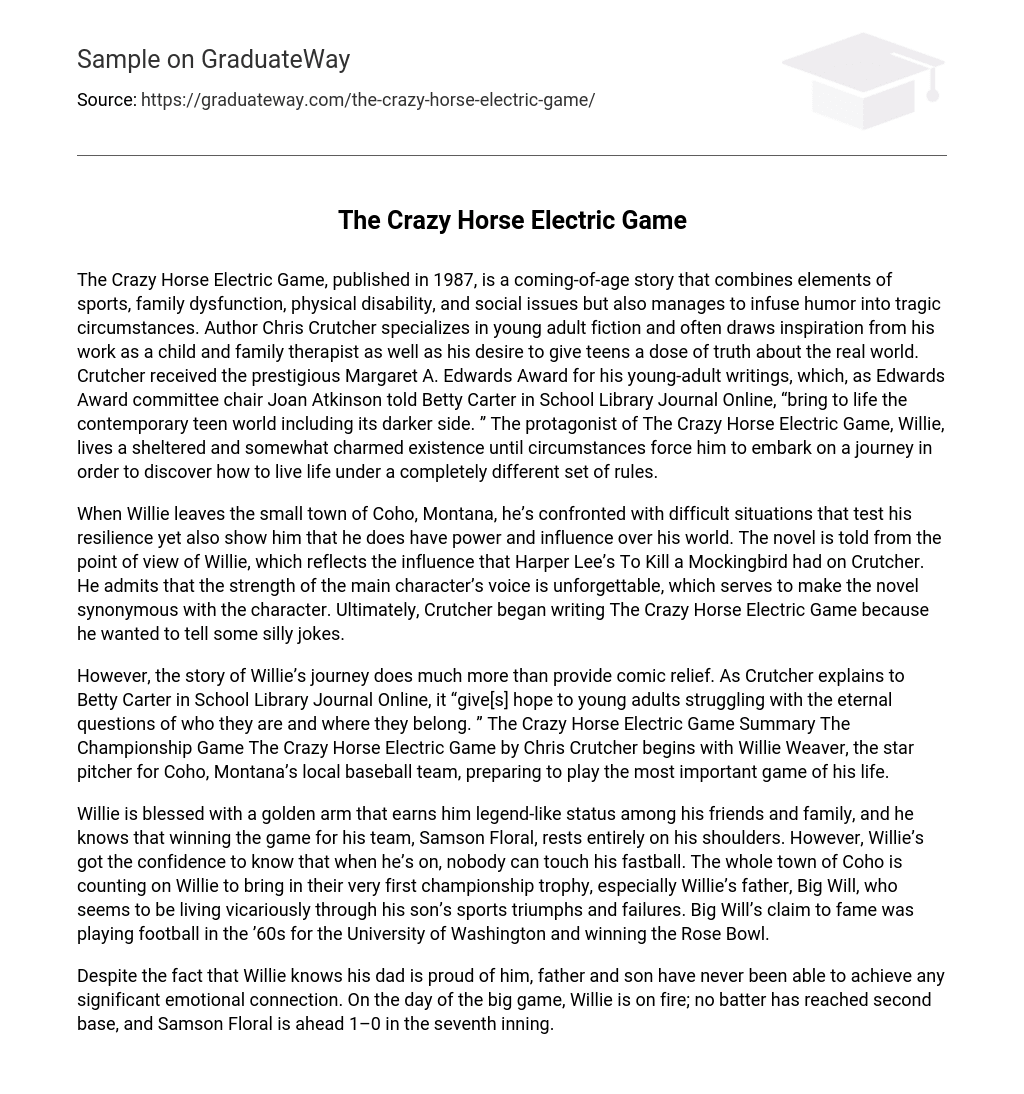The coming-of-age story that combines elements of sports, family dysfunction, physical disability, and social issues but also manages to infuse humor into tragic circumstances. Author Chris Crutcher specializes in young adult fiction and often draws inspiration from his work as a child and family therapist as well as his desire to give teens a dose of truth about the real world. Crutcher received the prestigious Margaret A. Edwards Award for his young-adult writings, which, as Edwards Award committee chair Joan Atkinson told Betty Carter in School Library Journal Online, “bring to life the contemporary teen world including its darker side. ” The protagonist of The Crazy Horse Electric Game, Willie, lives a sheltered and somewhat charmed existence until circumstances force him to embark on a journey in order to discover how to live life under a completely different set of rules.
When Willie leaves the small town of Coho, Montana, he’s confronted with difficult situations that test his resilience yet also show him that he does have power and influence over his world. The novel is told from the point of view of Willie, which reflects the influence that Harper Lee’s To Kill a Mockingbird had on Crutcher. He admits that the strength of the main character’s voice is unforgettable, which serves to make the novel synonymous with the character. Ultimately, Crutcher began writing The Crazy Horse Electric Game because he wanted to tell some silly jokes.
However, the story of Willie’s journey does much more than provide comic relief. As Crutcher explains to Betty Carter in School Library Journal Online, it “give[s] hope to young adults struggling with the eternal questions of who they are and where they belong. ” The Crazy Horse Electric Game Summary The Championship Game The Crazy Horse Electric Game by Chris Crutcher begins with Willie Weaver, the star pitcher for Coho, Montana’s local baseball team, preparing to play the most important game of his life.
Willie is blessed with a golden arm that earns him legend-like status among his friends and family, and he knows that winning the game for his team, Samson Floral, rests entirely on his shoulders. However, Willie’s got the confidence to know that when he’s on, nobody can touch his fastball. The whole town of Coho is counting on Willie to bring in their very first championship trophy, especially Willie’s father, Big Will, who seems to be living vicariously through his son’s sports triumphs and failures. Big Will’s claim to fame was playing football in the ’60s for the University of Washington and winning the Rose Bowl.
Despite the fact that Willie knows his dad is proud of him, father and son have never been able to achieve any significant emotional connection. On the day of the big game, Willie is on fire; no batter has reached second base, and Samson Floral is ahead 1–0 in the seventh inning. By the bottom on the ninth, however, Willie makes his first mistake of the game, putting the tying run on first just before the opposing team’s big hitter steps up to the plate. When the next pitch is thrown, Willie loses his balance as the ball is hit hard toward third base.
Miraculously, Willie catches the line drive on pure instinct and “etches the Crazy Horse Electric game in the mind of every citizen and ball player and coach—maybe even dog and cat—in Coho, Montana. ” The Accident With the championship under his belt, Willie is riding high for the whole summer. On a weekend getaway with his parents, his girlfriend, Jenny, and best friend, Johnny, Willie has a tragic accident while water skiing that leaves him physically disabled. The body he once had complete power over is now broken and out of his control.
Willie feels ashamed, embarrassed, and frustrated over his condition. He wants to avoid everyone, but Jenny and his friends insist on bringing him back into the fold. Despite everyone’s efforts to make Willie feel comfortable, their behavior has the opposite effect. Willie can’t stand the pity and begins to retreat into his own world, which is wrought with depression and suicidal thoughts. Willie’s parents send him to a therapist, who tries to help Willie deal with his feelings about the accident. After a few sessions, it seems as if Willie is making some





